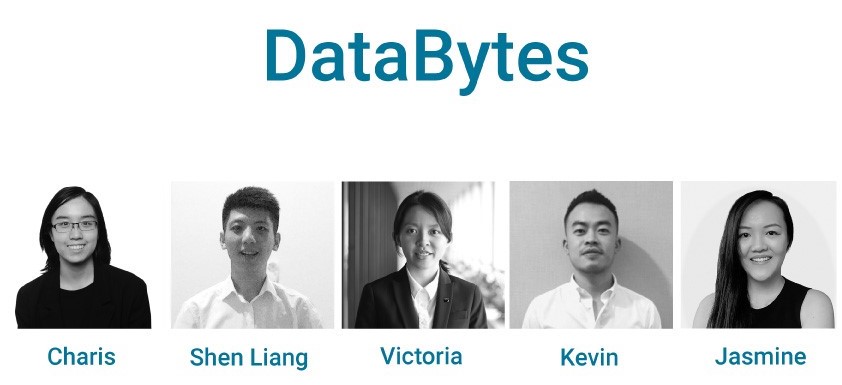
Recently, our students: Victoria, Jasmine, Shen Liang, Kevin and Charis, formed Team Databytes to participate in Microsoft’s APAC AI for Accessibility Virtual Hackathon.
With their app Matamata, they came out as one of the top five winners in Malaysia!
You could be next.
But how do you win a hackathon or a data science competition? Should you even join a hackathon with the little time and urgent responsibilities you have? What if you don’t have the skills needed to win?
We understand that you’re nervous.
Which is why in this article, Team Databytes will be sharing their experience to show you how to win a hackathon and why you shouldn’t miss out on this golden opportunity in your growth as a professional data scientist.
“I Don’t Have Time to Join a Hackathon – So Why Should I?”

Time was a major concern for all members of team databytes.
Since they all came from different backgrounds and professions, the members rarely had their schedules aligned, making it difficult to plan meetings.
Being full-time university students and adults also made it difficult to find time in their own schedules to work on their project.
Yet despite this, the proposal for Matamata was made in 2 days.
The app was completed within 2 weeks.
While developing an app for a competition may seem difficult to manage alongside work responsibilities, it is actually feasible with flexible time management and proper job delegation.
You might be thinking: “Well, people in this competition must be extremely skilled. How can I compete against that when I’m just starting out?”
There was certainly a lot of competition in the hackathon. When Team Databytes signed up for the competition, they had to compete against 38 teams in Malaysia.
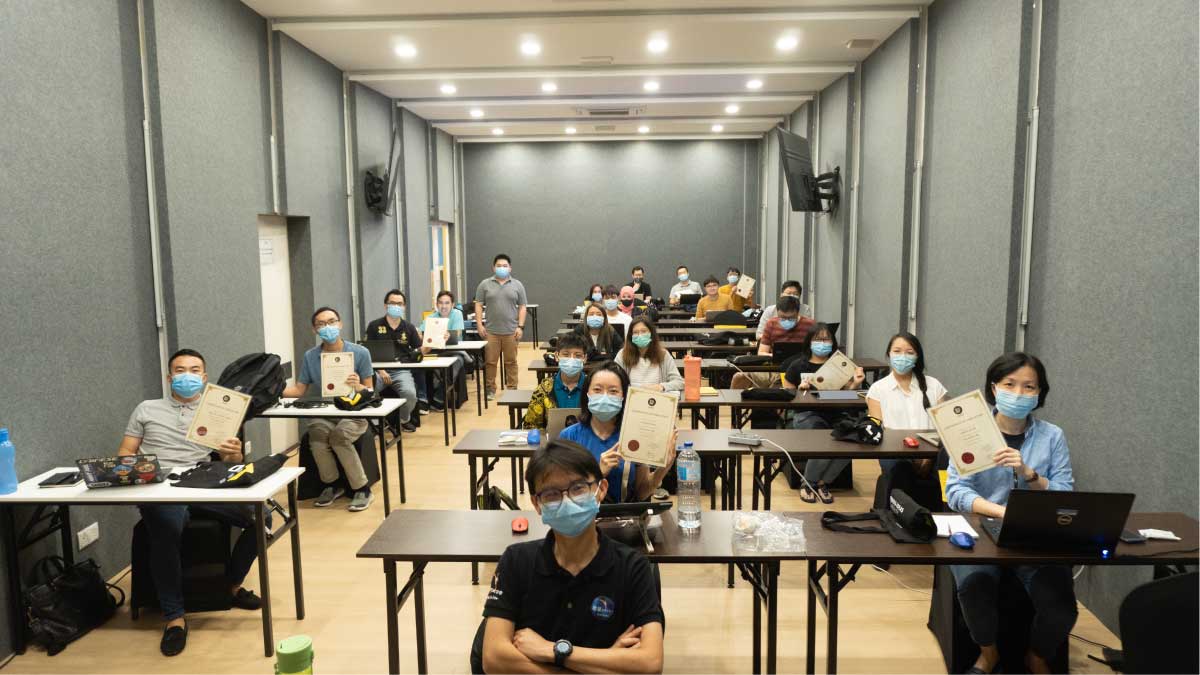
What’s more, they all had only started learning data science late last year.
In fact, they all came from the same Data Science 360 class!
A high skill level will give you an advantage in a data science competition, but it’s not the only determining factor. What matters is that you have the skills needed to create an app that fulfills the competition’s requirements.
Acknowledging their lack of skill, Team Databytes focused on developing the skeleton of a simple app that makes real life improvements to the visually impaired rather than a complicated app with lots of functionality.
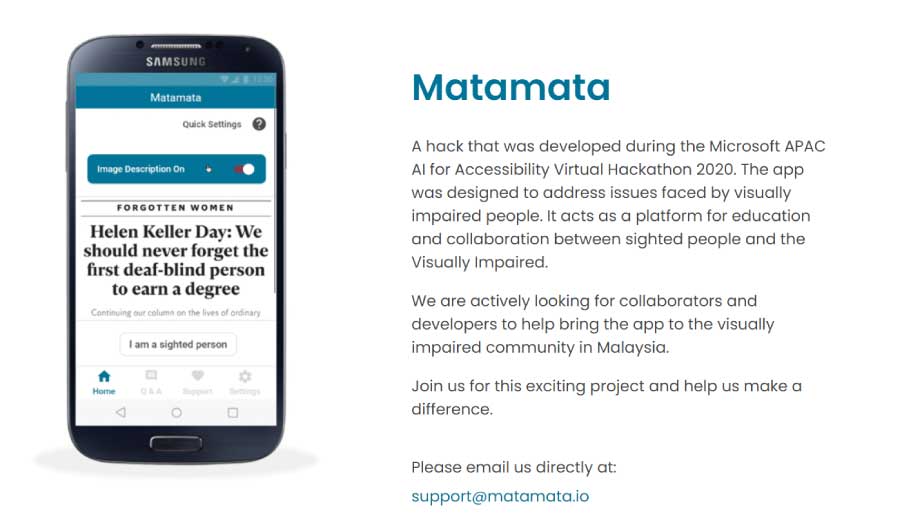
Visually impaired individuals are already using phones, iPads and computers just like any of us. They search the internet with voice recognition software, hear articles read aloud by text to speech programs and some even use braille keyboards to read text.
However, when it comes to social media platforms such as Instagram, they often feel disconnected since 80% of the content is sight-based.
Matamata breaks this barrier open with its ability to describe pictures to the user. This allows visually impaired people to access more online platforms and engage with others to create a more inclusive online community.
To create this app, all Team Databytes needed were a few necessary codes found in Microsoft’s handbook, their current level of skill and their time.
Your lack of experience shouldn’t hold you back from participating. Instead, find ways to achieve your goal with the skills you have.
How Did Team DataBytes Win?
When Team Databytes heard that they were chosen to go into the final round, they were surprised that it happened – but it was not unexpected.
They knew if they kept these 5 qualities in mind as they worked on their project, they are sure to reach the final stage.
1 – Coordination
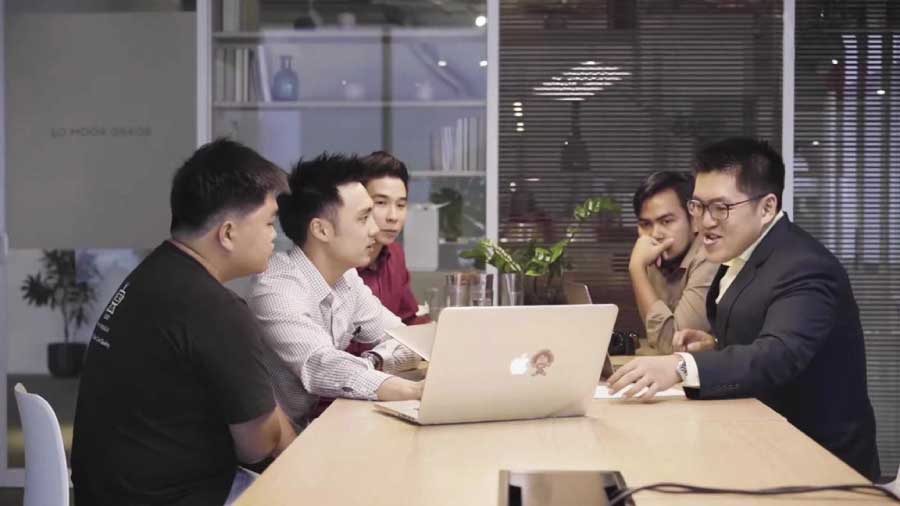
It definitely pays to be organised, but organisation only works if there is coordination.
When it comes to group projects, the purpose of organisation isn’t just to make sure you can keep track of your work. Organisation is meant to keep everyone on track with the latest updates.
To have good coordination, you need to have 3 things:
- Clear Delegation of Roles and Responsibilities: This is to make sure that no one would be shouldering more work than they should or able to take on. Of course, when you delegate, you should consider everyone’s time commitments, capabilities and strengths.You should also consider the demands of each job as well.
- Centralize all forms of communication and documentation: Rather than having multiple files to accommodate each part of the project, Team Databytes used a master document so that everyone is up to date on what everyone is doing.They also used Slack as their central form of communication.
- Accountability: The other two points will only work if every person is accountable to their own work and checks in on one another. If one person cannot make it, they are responsible to give their feedback or bring issues up to the group before the meeting starts.For those who are present, they are responsible to keep their missing teammates updated.
2 – Focus on What You’re Capable of
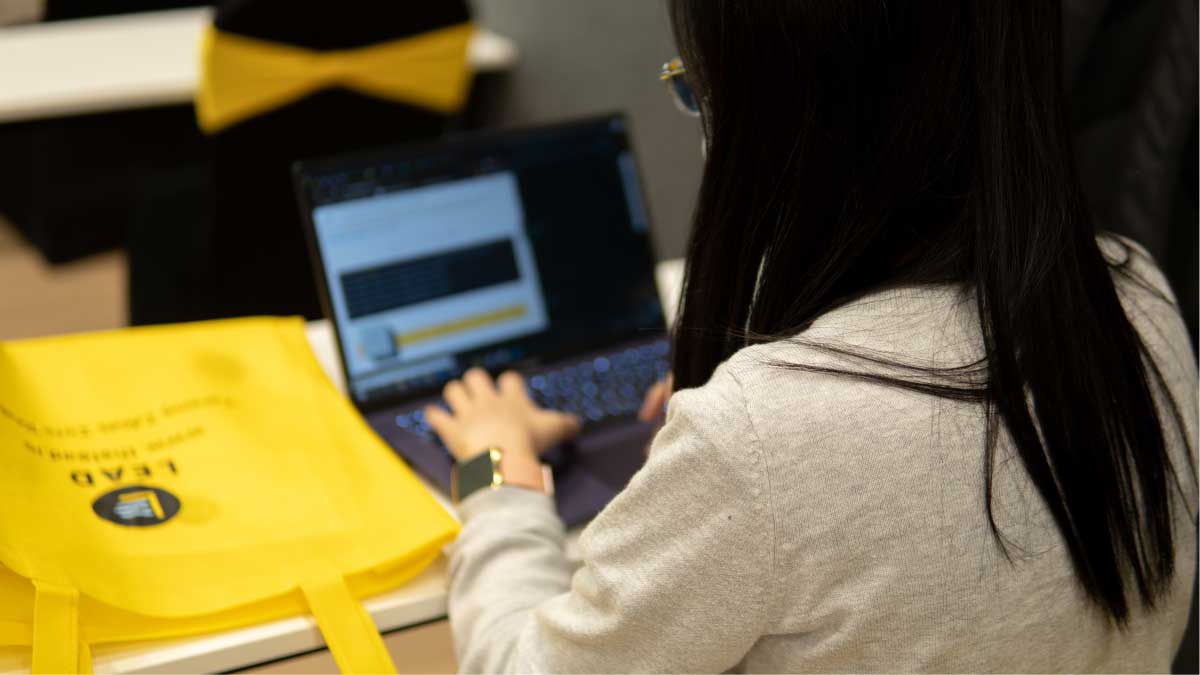
It’s okay if you’re not an expert in programming. That shouldn’t hold you back from participating in a hackathon.
But that doesn’t mean it’s a good time to try out new techniques or complex models. Trying out new techniques or models for the sake of the competition will create an unnecessary challenge for yourself.
Be realistic: use your current strengths and capabilities to create a functional skeleton of an app first.
Because of Matamata’s simplicity, Team Databytes was able to program a highly useful app within the time frame.
Your main objective is to fulfill the requirements of the competition. Afterwards, you can code additional features into your project that will make you stand out from your competitors.
This will save you precious time needed to perfect your programming. After all, you don’t need a complex app or high level skills to win.
3 – Clear Communication
As Charis, the business manager of Team Databytes, summaries: communication is key.
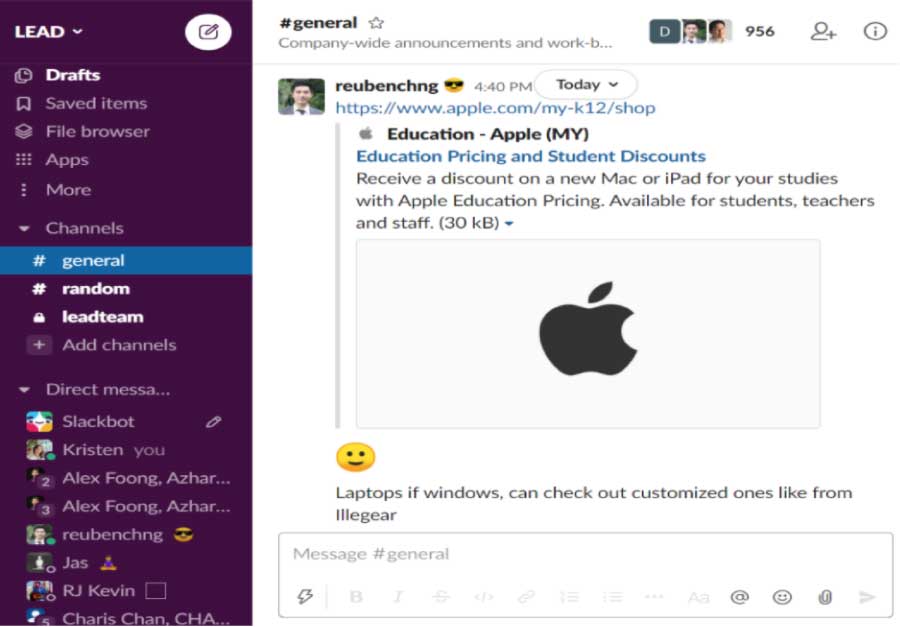
While centralizing all information and communication does help, you need to be clear, direct and detailed when you pass on messages.
This is especially useful when there is so much to keep track in a project; you don’t want to waste time rambling on about one point.
Shen Liang, one of the back-end developers, said that he has missed out on a few meetings because he works as a project engineer during the day and can only program at night.
Despite this, he is clear about what’s going on in the team thanks to the detailed minutes written by their front-end developer, Jasmine.
4 – Commitment

Participating in a competition is not going to be convenient. You may have to rearrange your schedule, stay up a few hours late into the night and spend extra time fixing a bug you didn’t expect.
It’s tempting to use your responsibility as an excuse, but to really commit and win a competition, you need to adapt and be more flexible with your time and activities.
It all depends on your priorities.
For example: you have to start working on the back-end for the NLP feature today to be able to complete. However, you also have an important pitch to finalise the next day.
Of course, the first thing you need to do is settle your pitch. But then, make extra time to work on your project. This can include using some of your free time to program the backend or staying up a bit later to complete it.
You are also working as a team, so if anything gets too overwhelming, you can ask for an extra hand.
If your team has different working hours, you can work separately and still be united as a whole. This is why coordination is important.
Victoria, the team coordinator, remarked:
“But getting into the top 5 is not so unexpected because, in the sense that, all my teammates really put in a lot of effort. We did a lot of work and we got good mentorship from Dr. Lau.”
5 – Presentation is as important as the Project itself
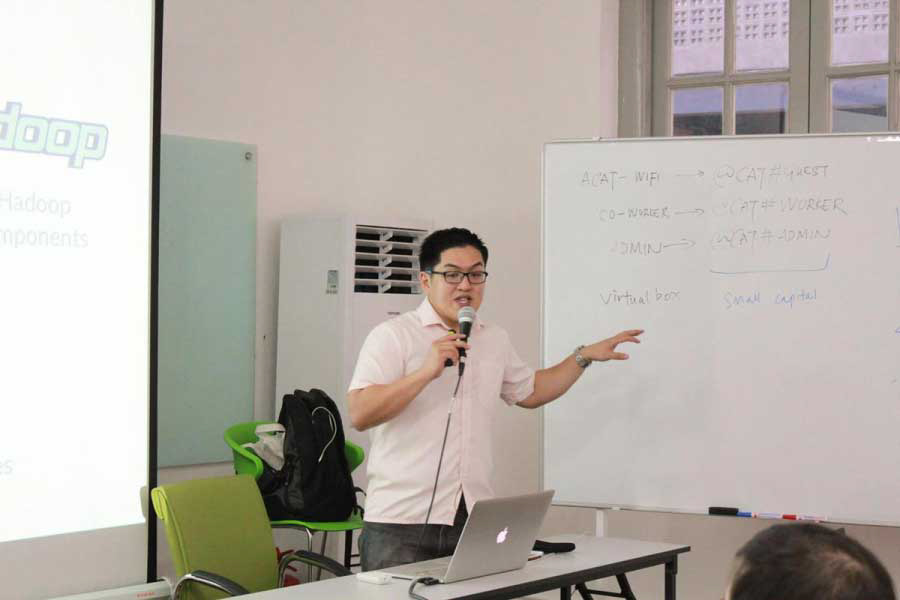
The project itself is the most important part of the hackathon, but its presentation is also equally important when it comes to winning.
As advised by their mentor Dr. Lau: no matter how good your app is, people don’t know how good it is unless they try it for themselves, or when your storytelling convinces them so.
Simple presentation tips such as showing your face, using empathy and using layman’s terms for your app goes a long way in creating a connection between you and your audience.
With good storytelling skills, you can cross the technical barriers and make it easy for judges to understand your vision.
This was also one of their winning factors for the final round.
Is it worth joining a Hackaton?
The short answer – yes, it’s absolutely worth it.
The long answer: Team Databytes knew before the hackathon that it was a valuable opportunity not to be missed. Being a part of the competition solidified this belief.
Before entering the competition, hackathon had presented them the perfect opportunity to develop their skill.
Kevin (Back-end Developer): “If we keep on learning and keep on inputting, but there is no way to execute and not grow from there, we are losing those opportunities. For me, it’s getting out of the comfort zone to learn new stuff.”
Joining the hackathon was a huge learning curve for them.
It’s one thing to learn the theory and codes in data science, it’s a whole other level to immediately apply it in your everyday work.
Through practice and application to projects that really make a difference, you’ll find a drive to learn and it is much easier to learn when you’re reaping results.
Data Science competitions also give a new realm of exposure. When Team Databytes joined hackathon, they were opened to a world of technology they had not considered before.
Charis: “The theme really caught my eye because it’s something on sustainability, which is something I feel is a topic that is not commonly mentioned in a hackathon. Normally, it’s part of the SDG (Sustainable Development Goals) issues, but this is something to make it more inclusive for the people around us.”
But the one thing that really attracted them to the competition wasn’t the prize; it was the cause.
While they were aware of how technology can assist those with disabilities, the impact of understanding how it transforms the lives of those with disabilities hit differently when they were going through the competition.
Jasmine: “It didn’t really feel like a real project, really. It was more like a competition. It wasn’t really real until we got Moses Choo on Zoom. This isn’t just about a competition. It really was something where we could really help people to do better in life, to help make their lives better.”
Their exposure isn’t just from the visually impaired community, but their teammates from different backgrounds as well.
Victoria: “It’s really good exposure. For myself, yes, at that time I’m still a student and I am working with all these very impressive people who are already working, and I do learn a lot from each of them. It’s a really good experience, a very good eye-opener.”
The project that you work on doesn’t have to be confined in the competition. It can actually be a place for new opportunities.
Now, Team Databytes is planning to develop Matamata into a full-blown app:
Kevin: From our research on the apps [like Matamata] that’s available on the market, a lot of it is there in the market but a lot of it isn’t being localized. For our direction, we want to localize things. Perhaps, we can offer it in terms of bahasa, for example.
Currently, Team Databytes are looking for more data science developers to work on this project and are working with the blind and visually impaired community in Malaysia, to further optimize their app to suit the blind lifestyle. (and yes, if you’re an NGO in this field, do reach out to them!)
While the team admits that balancing between work life and the hackathon was difficult, their commitment and team organizational skills made this project possible.
Final Thoughts

You must be thinking: Wow! This sounds amazing! I want to join the next hackathon or any data science competition… but I’m still scared.
Team Databytes were united in their response: just do it.
Regardless of whether you’re skilled or not, the time that you have or any other concerns, the experience and exposure you get will triumph these fears.
Charis elaborates that you shouldn’t go into the competition with the mindset of getting the prize. While it is a main motivator, the main takeaway should be the experience of making the project with the people beside you.



0 Comments